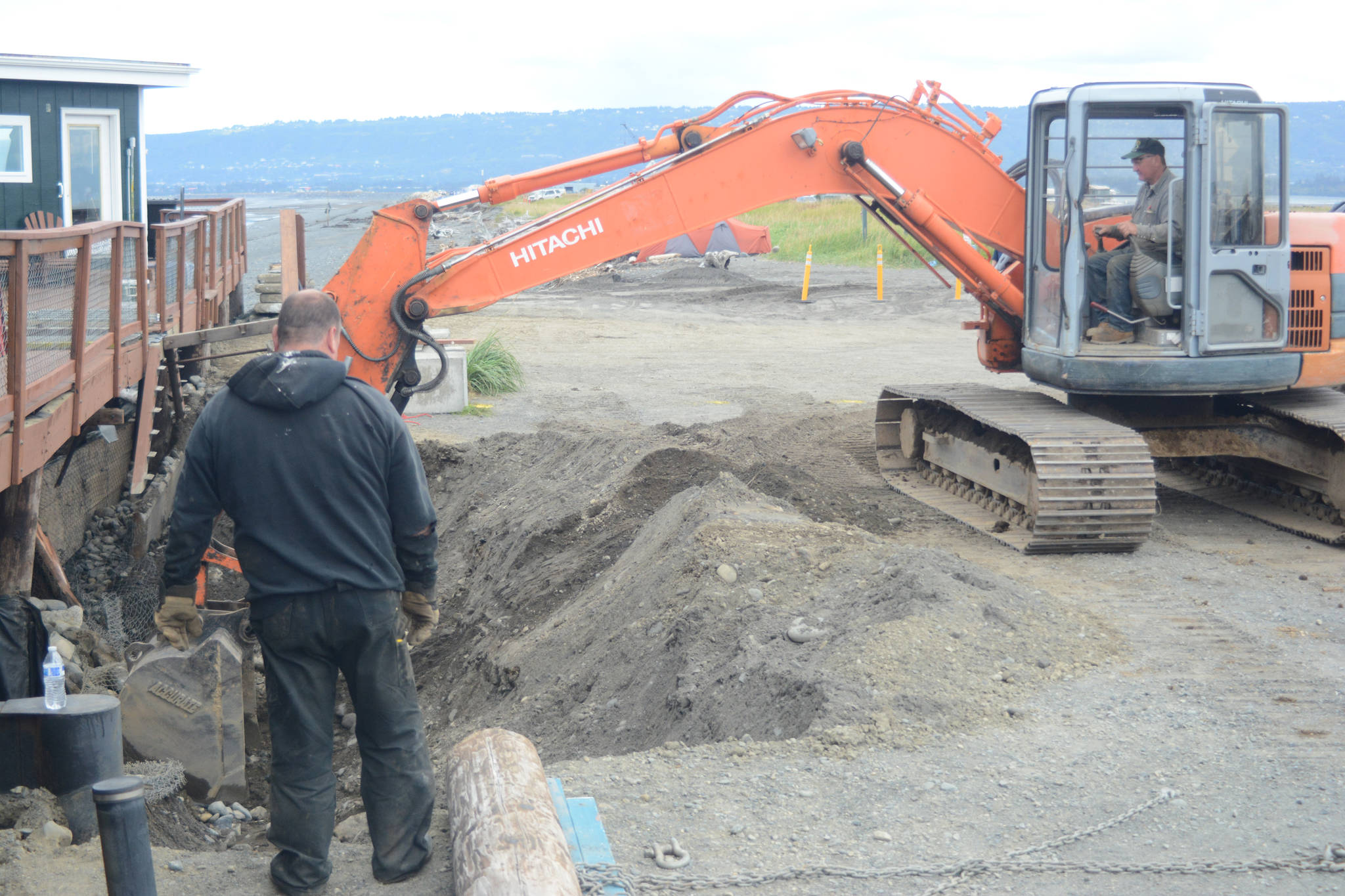A series of storms and high tides last week sucked tons of sand and gravel out into Kachemak Bay from the middle of the Homer Spit.The erosion threatens a landmark Homer restaurant, the Glacier Drive-In, and other buildings on the outer bay side of the Spit.
The erosion started Monday, Aug. 13, when big waves swept down the Spit along rock rip-rap that runs from Mariner Park to west of the Glacier Drive-In. Restaurant owner Lee Pedersen said the boardwalk there takes the brunt of the waves.
“We’re the first in line,” he said. “Now there’s nothing to stop it.”
Standing by a newly cut section parallel to the edge of the beach on Thursday Aug. 16, Pedersen held out his arm to show the height of the old beach. He said he estimated a a section running along the beach that was 25 feet deep and 6 feet high got washed away in storms last week.
After Monday’s storm, Wise Services repaired the erosion. Then another storm came in on the next tide and washed away the repairs.
“We went from heroes to zeroes,” John Wise said.
On Aug. 16, Wise and his brother Nathan Wise worked to fill in a big sinkhole that boiled up in front of the Glacier Drive-In stairs. A pile of concrete slabs and gabions, or large wire boxes filled with gravel, hold up the parking lot in front of the Glacier Drive-In boardwalk. The boardwalk extends out from the parking lot, set on large steel pilings pounded into the beach. The gabions and armor rock kept the parking lot from falling into the bay. Even then, the storm washed out gravel from behind the retaining wall.
“If he hadn’t done that, he might be in more serious trouble,” said Homer Public Works Director Carey Meyer.
Because of the erosion and repairs needed, Pedersen closed the Glacier Drive-In a few days early. He had planned on closing last weekend anyway.
The storm also had washed away sand and gravel covering a sewer line next to the Glacier Drive-In. Meyer said city workers covered the line with dredge spoils. One of the ironies of beach movement on the Spit is that sand eroded from the middle of the Spit gets swept down to the end of the Spit and into channels by the harbor mouth that then needs to be dredged.
Since buying the restaurant six years ago, Pedersen has made extensive repairs to the Glacier Drive-In boardwalk going back to 2016. In 2017 he spent about $100,000 to rebuild the wooden deck with steel beams, and drove new steel pilings to support the boardwalk.
“If I hadn’t done that, this building would have fallen off,” Pedersen. “…I’m just trying to save a Homer landmark.”
Last week’s erosion also destroyed a section of beach in front of tent camping sites west of the Glacier Drive-In. In years past campers could drive along the beach and have room to pitch tents. The city moved a campground office building several years ago when the threat of erosion increased.
“There’s a bunch of property there that has become a lot narrower, not just the city property we use for tent camping,” Meyer said. “There’s barely a strip of land left for tent camping.”
Pedersen said he thinks the long-term solution is to extend the seawall along the Spit Road to his property.
“We will not save the Spit unless we put in armor rock,” he said.
The Alaska Department of Transportation & Public Facilities has looked at the potential impact to the Spit Road, but has determined erosion isn’t impacting state infrastructure at this time, said Shannon McCarthy, a DOT spokesperson.
Reach Michael Armstrong at marmstrong@homernews.com.

